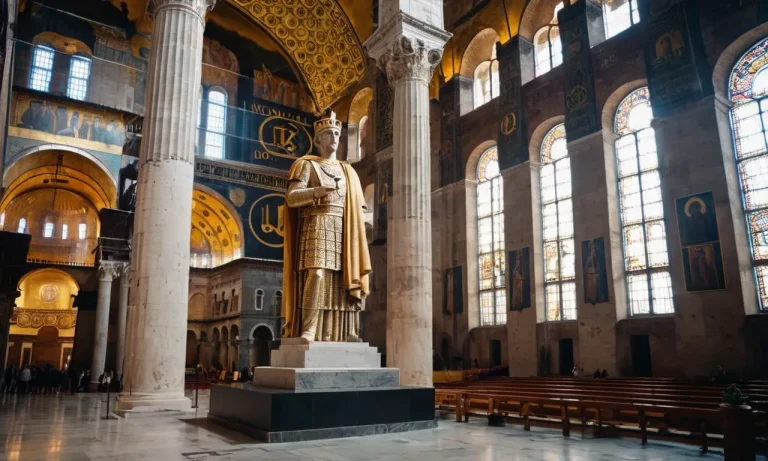What Does God Call His Children?
God views all human beings as His children. Regardless of gender, race, ethnicity, or religious beliefs, we are all part of God’s family in the eyes of most major religions.
If you’re short on time, here’s a quick answer to your question: God refers to human beings as His sons and daughters in religious texts across faiths like Christianity, Judaism, Islam and more.
In this comprehensive guide, we will explore the various names and meanings behind what God calls His children according to different religious traditions. We will analyze biblical verses as well as verses from the Torah and Quran that refer to mankind as God’s offspring.
Children of God in Christianity
Sons and Daughters of God
In Christianity, believers are considered to be children of God once they put their faith in Jesus Christ as their Lord and Savior. When someone becomes a Christian, they are spiritually born again and adopted into God’s family (John 1:12-13). This is an act of God’s grace, love and mercy.
Christians believe that God wonderfully made them and loves them unconditionally as His own sons and daughters.
According to the Bible, Christians are “heirs of God and co-heirs with Christ” (Romans 8:17). This means that they are promised eternal life in heaven as God’s children. Christians call God “Abba Father” and can come directly to Him with their needs and requests, just as children come to their earthly father (Romans 8:15).
What an amazing privilege! God promises to always be there for His children and answer their prayers according to His perfect will.
As God’s children, Christians are urged to imitate their Heavenly Father and live lives characterized by love, joy, peace, patience, kindness and self-control (Ephesians 5:1-2). They also have a responsibility to share the Gospel and make more disciples for the growth of God’s family (Matthew 28:19-20).
When Christians love and serve others, they bring great joy to their Abba Father!
Brothers and Sisters in Christ
Not only has God adopted believers as His sons and daughters, but they are also brothers and sisters in Christ. All Christians are part of God’s family and united together in faith. They are connected in a special spiritual bond as siblings in God’s household.
Just as with biological families, Christians don’t always agree or get along perfectly. However, they are still commanded to love one another. Jesus said that people will know His disciples by their Christ-like love for each other (John 13:35).
Christians are to be devoted to one another with brotherly affection, outdoing each other in showing honor (Romans 12:10). What an awesome testimony when believers demonstrate true, sacrificial love!
God’s family spans all ages, races, cultures and backgrounds. It is an incredibly diverse group of people being transformed into the image of Jesus. Christians rejoice that they will spend eternity in heaven praising God together as one unified family.
They strive to build strong spiritual relationships and live in harmony as brothers and sisters on earth, just as they will in heaven.
B’nei Yisrael (Children of Israel) in Judaism
Chosen People
According to the Tanakh, the Children of Israel occupy a unique place as God’s chosen people (“The Chosen People”). They received the Torah at Mount Sinai and accepted the covenant with God to follow his commandments.
This special relationship as God’s treasured possession is referenced in Exodus 19:5: “Now if you obey me fully and keep my covenant, then out of all nations you will be my treasured possession.”
What does it mean to be the “chosen people”? First, it is not a superiority complex – Jewish tradition emphasizes all people are created equal by God. Rather, Jews have a duty to spread ethical monotheism and be a “light unto the nations.”
Second, chosenness comes with responsibility and hardship, to uphold higher moral standards. This explains centuries of persecution. Overall, being the chosen people is seen as a blessing but also a burden.
God’s Firstborn Son (Israel)
God refers to the nation of Israel as his “firstborn son” in Exodus 4:22, bringing them out of slavery in Egypt with great power. This father-son metaphor signifies the special intimate bond between God and his people. It also confers rights like inheritance and legacy.
As firstborn son, Israel inherits the Promised Land and responsibility to pass on the monotheistic faith to future generations.
This tie between God and Israel as father and firstborn son is referenced in later prophetic books like Hosea and Jeremiah. Though the children of Israel sin and anger God, repeatedly breaking the covenant, God’s parental love means he repeatedly forgives them when they repent.
Like a doting father, God cannot abandon Israel forever. This special favor is not because Israel earned it through righteousness, but due to God’s gracious choice.
Believers as Offspring in Islam
Sons and Daughters of Adam
In Islam, all human beings are considered the children of Adam and Eve. The Quran states that God created Adam from dust and then created Eve from Adam’s rib. “O mankind! Be dutiful to your Lord, Who created you from a single person (Adam), and from him (Adam) He created his wife Hawwa (Eve), and from them both He created many men and women.”
(Quran 4:1)
Therefore, despite differences in language, ethnicity, culture, etc., Muslims believe that all people are part of one human family. God honored the children of Adam and made them stewards over the earth.
“And indeed We have honored the Children of Adam, and We have carried them on land and sea, and have provided them with lawful good things, and have preferred them above many of those whom We have created with a marked preferment.” (Quran 17:70)
In the Islamic view, the common origin of humanity should inspire people to treat others with dignity and respect. Rather than looking down on others due to race, class or gender, Muslims are taught to honor the inherent worth and humanity of all people.
Slaves and Servants of Allah
While all humans are considered children of Adam, the Quran also states that believers take on a special status as slaves/servants of God. “And mention, O Muhammad, when your Lord said to the angels, ‘Indeed, I will make upon the earth a successive authority.’
They said, ‘Will You place upon it one who causes corruption therein and sheds blood, while we declare Your praise and sanctify You?’ Allah said, ‘Indeed, I know that which you do not know.'” (Quran 2:30)
This verse indicates that humans have the unique ability, unlike angels, to choose faith and morality. Those who believe in the One God and follow His guidance are elevated as His vicegerents and servants. “Blessed is He in whose hand is dominion, and He is over all things competent.
He who created death and life to test you as to which of you is best in deed – and He is the Exalted in Might, the Forgiving.” (Quran 67:1-2)
Thus, believers strive to worship God alone and obey His commandments. Their servitude earns them honor and eternal reward in paradise. “But the ones who believe and do righteous deeds – those are the companions of Paradise; they will abide therein eternally.” (Quran 2:82)
Universal Family of God
Common Themes Across Religions
Though the world contains a beautiful mosaic of diverse faiths, certain universal truths resonate across many traditions. Most religions embrace the golden rule, encouraging followers to treat others as they wish to be treated.
Compassion is another shared ideal, inspiring people to care for the poor, sick, and marginalized. Faiths around the world also promote peace, justice, forgiveness, and selfless service. These common themes speak to our shared yearning to connect with the divine and with each other.
Scholars have identified other unifying threads across faiths. Many traditions stress the value of spiritual disciplines like prayer, meditation, fasting, and pilgrimage. Religions also emphasize moral living, wise judgment, and overcoming ego and materialism.
In addition, creation stories, concepts of the afterlife, and prophecies of a messianic figure pervade multiple faiths. Though the particulars differ, the universality of these ideas hints at our common humanity beneath surface differences.
Oneness in Diversity
Our rich religious diversity might seem like a dividing force, sparking conflict throughout history. But many interfaith leaders consider variety a blessing, not a curse. They argue that no single tradition has a monopoly on truth.
Rather, each offers unique spiritual gifts, and understanding them all is key to fully apprehending the divine. As Mahatma Gandhi famously said, “No culture can live if it attempts to be exclusive.”
Proponents of interfaith harmony encourage dialogue, cooperation, and celebration of our differences. They create spaces for people of all backgrounds to build relationships and gain insight into each other’s beliefs.
Over 100 interfaith councils and groups now exist in the US alone, promoting understanding through events, campaigns, and interreligious prayer services. Global interfaith conferences convene diverse faith leaders to cooperate on social justice issues.
Through interfaith marriage, children, and shared worship spaces, religious boundaries are also organically dissolving. Despite inevitable points of theological tension, these efforts affirm that unity and diversity can complement rather than contradict each other.
Conclusion
In conclusion, God uses familial language like sons, daughters, children, and brethren to describe His relationship with humanity across major world religions. Though the specifics differ between faith traditions, most share the common message that all human beings are part of God’s family.
Some core themes unite these diverse perspectives – we are all God’s creation, called to love one another as spiritual siblings and serve our divine parent. Understanding how God views us can help promote tolerance and unity during these divided times.








